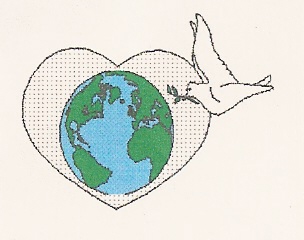The Joseph Project in Togo
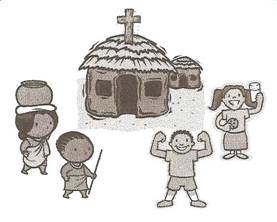 Joseph Project logoThe vision Joseph Project logoThe vision
The idea of the Joseph Project came about as a result of Shirley's visit in June 2008 to isolated villages on the Togo/Benin border. In every village there were appeals for help with the problem of ever-increasing numbers of orphaned children as a result of AIDS, cholera and deep poverty combined with lack of roads and health workers. We want to help local villagers solve their own problems (namely take care of orphans) and improve their general situation by introducing better methods of hygiene, sanitation and farming, and eventually develop a self-sustaining children’s home in Sika-Kondji, Togo. The KEY points about the Joseph Project are that it should be accomplished with minimum overseas funding so that any similar village can follow suit; and that the local team members themselves make decisions regarding new resources and methods that are best suited to the local situation. Western help will be focused mainly on providing simple technological ideas that will improve health, hygiene and sanitation, and produce better harvests of local crops. The initial project of the children’s home should involve the help of all the children as much as possible while also teaching them useful skills and applying biblical truths to the everyday work situations. It is hoped that in the future other villages will also be inspired by the example of the Joseph Project children’s home. Finally, after many trials and tests of faith, the orphanage finally opened in July 2012 with 20 girls and boys from several area villages - follow this link to read the latest exciting news! Watch a short power point presentation which explains all about the Joseph Project Orphanage and those involved. Follow this link: power point
Scroll down to read how the orphanage has continued to develop, with the latest exciting updates at the bottom.
|
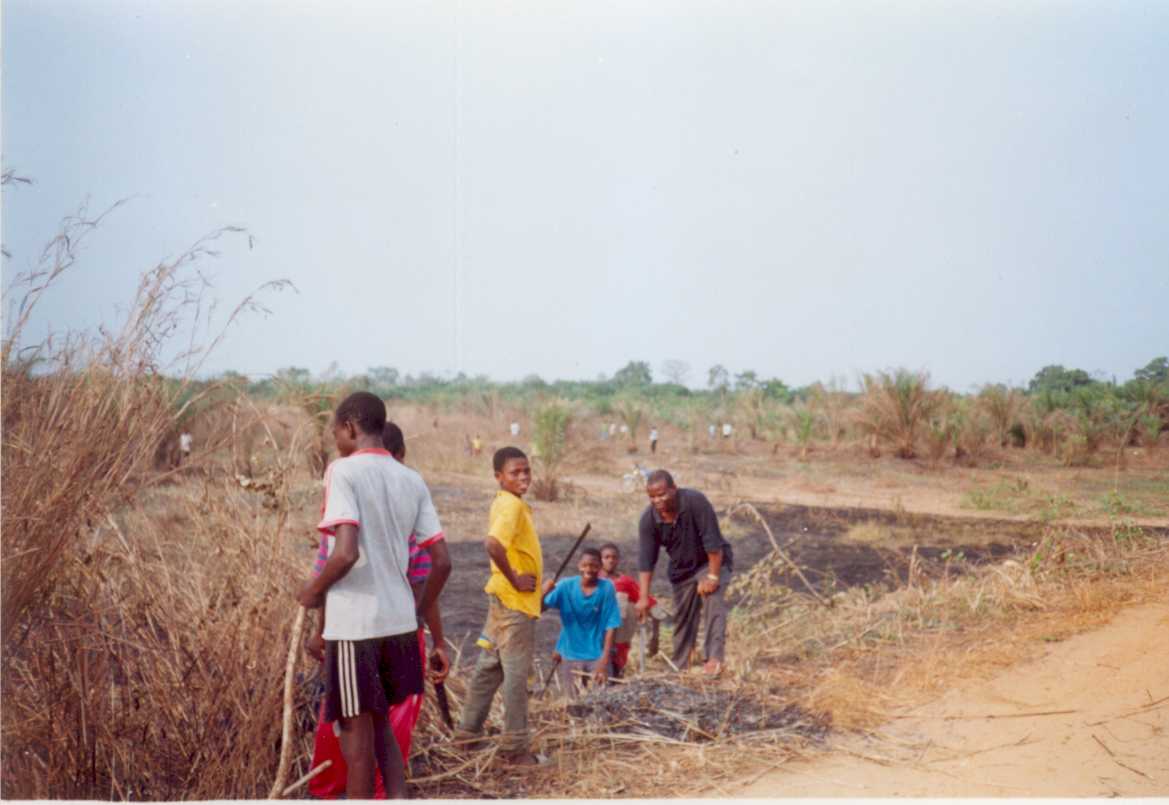 clearing the landAgricultural project clearing the landAgricultural project
Land donated by the chief for the children's home compound and for growing local crops to feed the orphans enabled us to start the agricultural phase of the project in early 2009. This picture shows the beginning of the work of clearing and ploughing the four acres of land donated by the chief of the village. Much work had to be done in preparation for planting corn, rice and peanuts to help provide regular food for the orphans while the rest of the project develops. The first year brought several challenges and then in August 2009 there was catastrophic flooding along the River Mono, which devastated many of the villages and crops, and in fact completely destroyed the peanut harvest, although the corn already harvested was a special blessing to the orphans and other needy villagers. The fields are ploughed and planted again in the early part of each year and thankfully there have been good corn harvests each August so far, with the orphans and some other local villagers helping. It is planned to plant one section with oil palm trees so that after about 5 years these will produce oil which is used for cooking and can be sold to surrounding villagers as another way to provide for the orphans. Progress of ag project
|
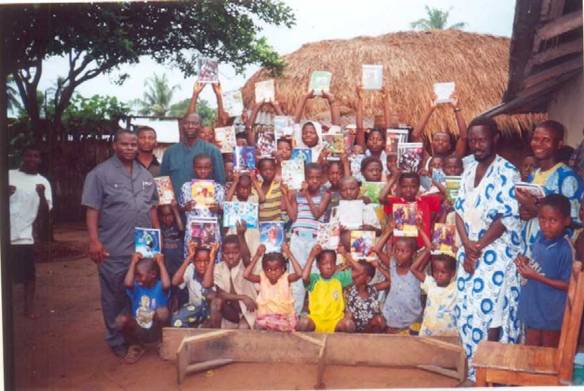 orphans receiving school suppliesProviding for the orphans orphans receiving school suppliesProviding for the orphans
The orphans in Sika-Kondji have had to live with villagers and receive some help in the form of school supplies, rice, clothes etc (whenever available) from Pastor Sika Yawo and his ministry that is based in the capital city of Lomé. However since about half of the village still worships idols, many of the children are treated more like servants and live in extreme poverty. Pastor Sika's local team members visit the orphans regularly to show love and teach about Jesus when they are permitted, but for many children these visits are the only ray of sunshine in the midst of the darkness and superstition in their daily lives. We believe that once these little ones can be cared for in a healthy and loving environment where they will also learn how to love and serve God, they will become agents of important change in both the village and surrounding area. We do not want the children (or local team) to become dependent on help from overseas, but until the orphanage can become self-supporting we would like to be able to help with some of the orphans' daily needs - only $100 per month will provide ALL the orphans with at least ONE basic meal of rice per day!If you would like to help, go to the page entitled "Get involved!" and CONTACT US!!
|
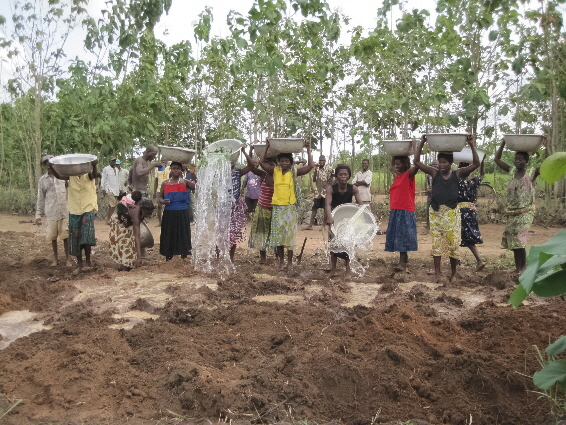 preparing to make bricksConstruction of the children's home preparing to make bricksConstruction of the children's home
In early 2011 we were able to send funds to finally start construction of the buildings on the two acres of land donated for the children's home in the village. Everything involves manual labor - clearing and preparing the land, as well as digging dirt and hauling water to mix mud for bricks, since the buildings are of the local village style. There were several hindrances but as many villagers (even elderly women) were able to get much-needed work helping with the building, everyone finally caught the vision and there was much excitement as the work progressed. This photo shows women pouring out water they carried from the river in order to mix mud for bricks.
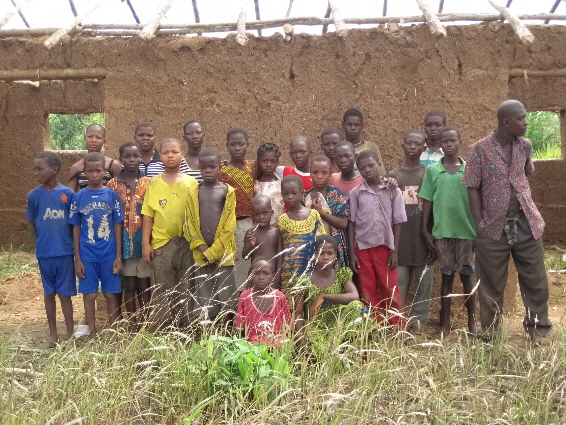 orphans with first buildingThis photo shows the group of orphans in front of the first of several buildings under construction. Plans included the provision of clean drinking water (through a shallow well and development of simple purification methods, which was accomplished in early 2012); well-built toilets and disposal of waste materials to prevent disease; and the introduction of simple, but effective ways to improve health and hygiene so that the children can learn how to live in a healthy manner from an early age. It is also planned later for the children to maintain a vegetable garden and raise chickens, goats and other small animals for food, which will teach them useful skills and to learn to trust in God to help them rather than depend on outside help. orphans with first buildingThis photo shows the group of orphans in front of the first of several buildings under construction. Plans included the provision of clean drinking water (through a shallow well and development of simple purification methods, which was accomplished in early 2012); well-built toilets and disposal of waste materials to prevent disease; and the introduction of simple, but effective ways to improve health and hygiene so that the children can learn how to live in a healthy manner from an early age. It is also planned later for the children to maintain a vegetable garden and raise chickens, goats and other small animals for food, which will teach them useful skills and to learn to trust in God to help them rather than depend on outside help.
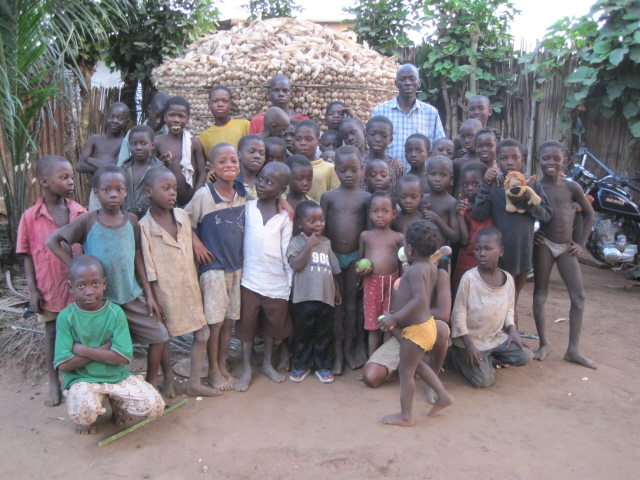 corn harvest The orphans themselves have been active in helping throughout the project and are excited as they see the dream finally becoming a reality. Once again they helped with the planting of corn and in August 2011 again they were blessed with another good harvest, which helped greatly to provide food in the ensuing months. Of course they continue to have ongoing needs such as clothing and school materials, so we try to send extra funds to help with these from time to time. During 2011 we connected with a ministry called "Little Dresses for Africa" which sent boxes of new clothes to Pastor Sika to give both to the orphans and other needy children in many surrounding villages - a wonderful blessing! corn harvest The orphans themselves have been active in helping throughout the project and are excited as they see the dream finally becoming a reality. Once again they helped with the planting of corn and in August 2011 again they were blessed with another good harvest, which helped greatly to provide food in the ensuing months. Of course they continue to have ongoing needs such as clothing and school materials, so we try to send extra funds to help with these from time to time. During 2011 we connected with a ministry called "Little Dresses for Africa" which sent boxes of new clothes to Pastor Sika to give both to the orphans and other needy children in many surrounding villages - a wonderful blessing!
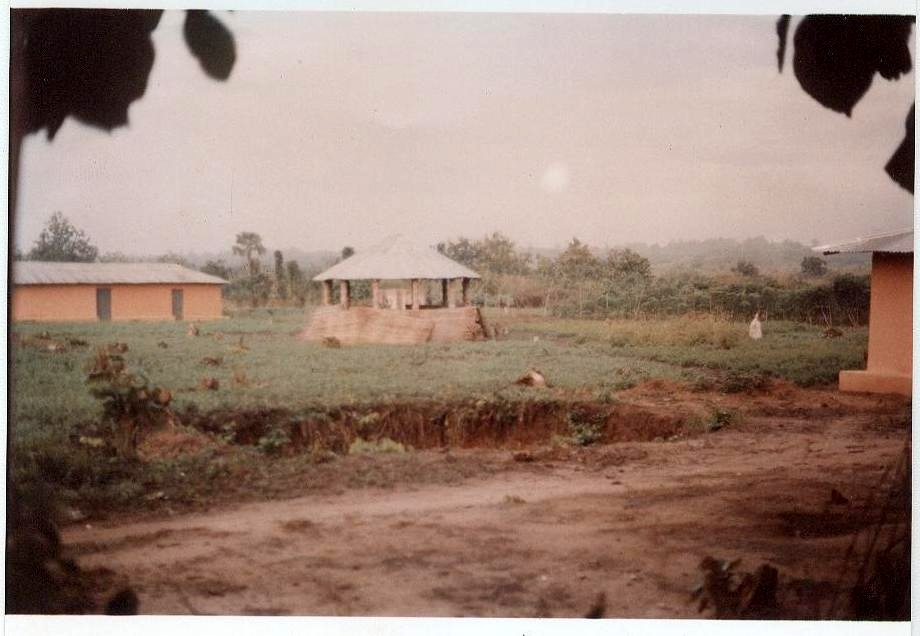 two buildingsThe two main buildings now completed are for use as dormitories, and there are three sets of bathrooms and toilets, and a central covered meeting area. Work continues on the kitchen area and the security fence around the property, and the shallow well is producing good water. Focus finally was able to turn to obtaining the furnishings and other final preparations, along with deciding on the staff and the first group of children to be accepted into the orphanage - around 20. It has been a long slow struggle with many hindrances and challenges both physically and spiritually, especially coming from the pagan people in the area, but the Lord has guided us through it all! To watch a special photo presentation of the development of the Joseph Project follow this link Joseph Project two buildingsThe two main buildings now completed are for use as dormitories, and there are three sets of bathrooms and toilets, and a central covered meeting area. Work continues on the kitchen area and the security fence around the property, and the shallow well is producing good water. Focus finally was able to turn to obtaining the furnishings and other final preparations, along with deciding on the staff and the first group of children to be accepted into the orphanage - around 20. It has been a long slow struggle with many hindrances and challenges both physically and spiritually, especially coming from the pagan people in the area, but the Lord has guided us through it all! To watch a special photo presentation of the development of the Joseph Project follow this link Joseph Project
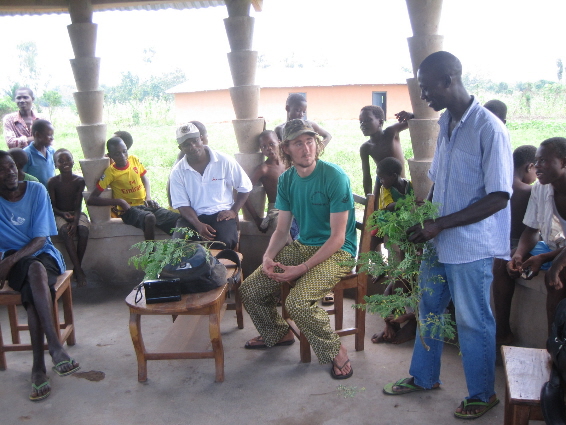 moringa trainingA main part of the vision is for the Joseph Project to be a place where the children can develop skills and learn new ideas that will be useful to them as they grow up whether they remain in the village or move elsewhere. In late 2011 a member of the Peace Corps visited and agreed to return later to teach the children and other villagers how to grow Moringa plants which are very high in nutrition, protein and important vitamins. Here he is explaining how the leaves of this amazing plant can be ground to a powder and added to soups and stews to improve nutrition on a daily basis. Various small farm animals will be obtained and the children will be taught improved methods of raising them so they will help provide much-needed food. As always the children receive regular bible teaching and are encouraged to grow in their faith with our Lord Jesus Christ. moringa trainingA main part of the vision is for the Joseph Project to be a place where the children can develop skills and learn new ideas that will be useful to them as they grow up whether they remain in the village or move elsewhere. In late 2011 a member of the Peace Corps visited and agreed to return later to teach the children and other villagers how to grow Moringa plants which are very high in nutrition, protein and important vitamins. Here he is explaining how the leaves of this amazing plant can be ground to a powder and added to soups and stews to improve nutrition on a daily basis. Various small farm animals will be obtained and the children will be taught improved methods of raising them so they will help provide much-needed food. As always the children receive regular bible teaching and are encouraged to grow in their faith with our Lord Jesus Christ.
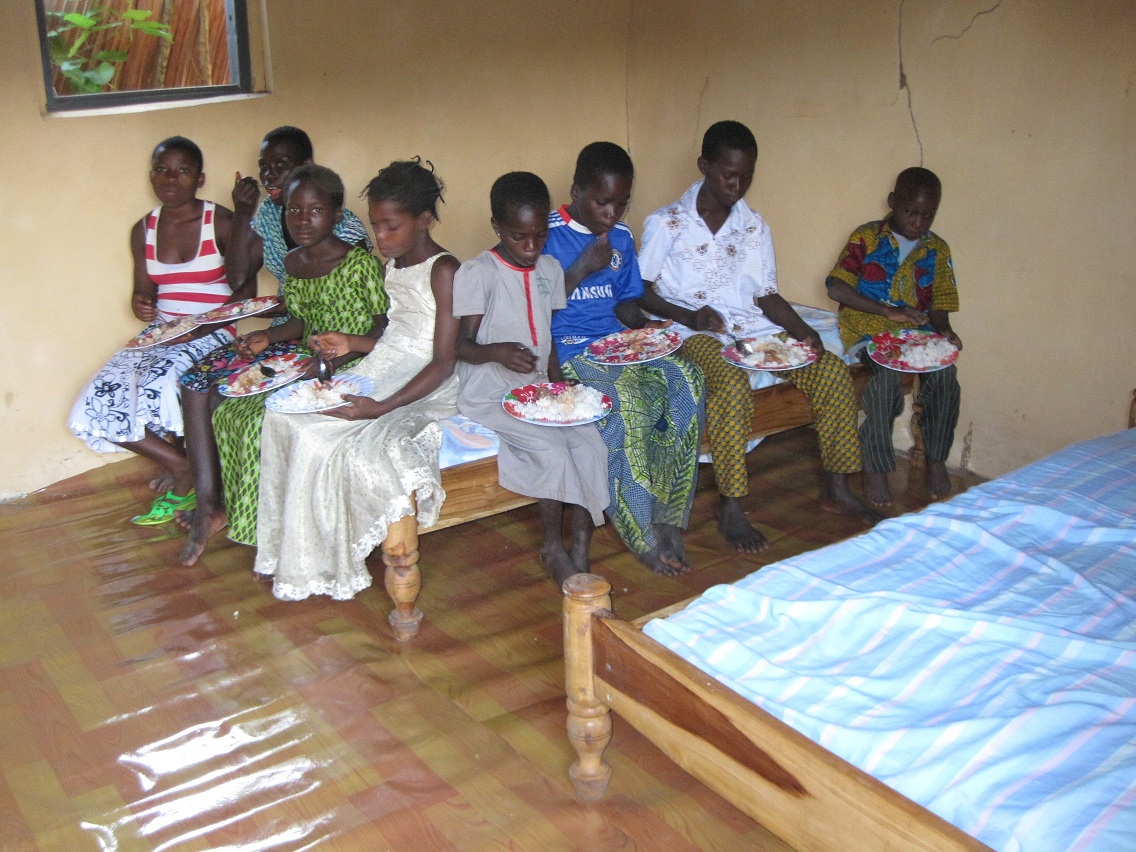 orphans eating The children's home opens! orphans eating The children's home opens!
Finally, in July 2012 the Joseph Project Orphanage became a reality as shown in this photo of the girls enjoying their first meal in their dormitory. A total of 20 children who have lost both parents have been accepted from Sika Kondji and 10 other surrounding villages. There are 13 boys and 7 girls ranging in age from 9 to 17 years old, since they will be able to help with the chores, harvesting the corn and caring for the farm animals that will soon be obtained. We need to provide school supplies so they can all continue in school as many have only had two or three years of school, and there will of course be emphasis on teaching them the Bible and sharing with them the Gospel. They are all very appreciative of this great opportunity and we look forward to sharing some of their testimonies in the months to come. It has been a huge step of faith to take on the responsibility of providing for these children and we pray that God will touch the hearts of many new people to get involved and help provide the funds and support needed over the months ahead until the Joseph Project is finally able to become more self-supporting.
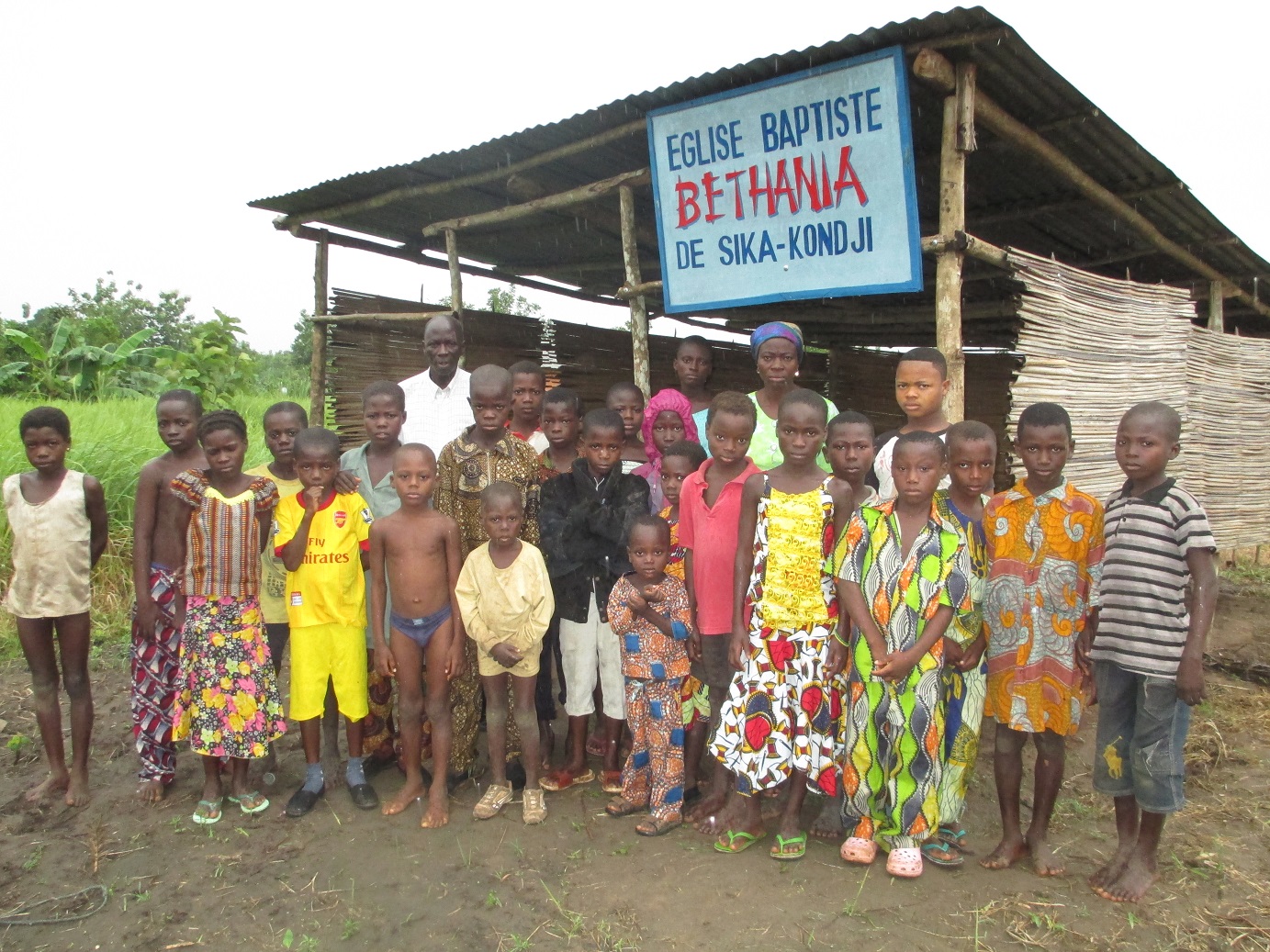 JP churchBy the first anniversary of the opening of the Joseph Project Orphanage, we were happy to report on some further developments - including the building of a small church on the property, which is now attended by local villagers as well as the staff and children at the JP. The children all attend the local school, and are helping with the vegetable garden and this year's planting of the corn crop. Pastor Sika visits them from Lomé and takes them occasional packages and letters sent by our supporters. It continues to be a work of faith, believing the Lord to meet their needs on a daily basis, but the staff and children continue to grow closer as a group as well as to the Lord. To read testimonies from the children follow this link Testimonies JP churchBy the first anniversary of the opening of the Joseph Project Orphanage, we were happy to report on some further developments - including the building of a small church on the property, which is now attended by local villagers as well as the staff and children at the JP. The children all attend the local school, and are helping with the vegetable garden and this year's planting of the corn crop. Pastor Sika visits them from Lomé and takes them occasional packages and letters sent by our supporters. It continues to be a work of faith, believing the Lord to meet their needs on a daily basis, but the staff and children continue to grow closer as a group as well as to the Lord. To read testimonies from the children follow this link Testimonies
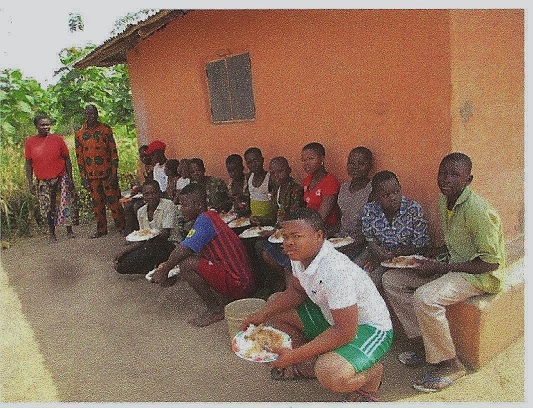 Orphans enjoying meal Christmas 2014 Orphans enjoying meal Christmas 2014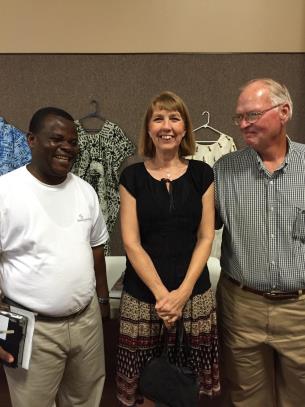 As of Summer 2014, seven of the older children had finished their schooling and been found live-in apprenticeships training in sewing, welding or masonry in larger cities. The past two years have been important in their young lives and helped prepare them to move into the adult world, and now the orphanage will begin looking for new orphans to accept into the Joseph Project. As of Summer 2014, seven of the older children had finished their schooling and been found live-in apprenticeships training in sewing, welding or masonry in larger cities. The past two years have been important in their young lives and helped prepare them to move into the adult world, and now the orphanage will begin looking for new orphans to accept into the Joseph Project.
Pastor Sika visited the United States during July/August 2015, spending the month of July with us here in East Texas. He spoke in several local churches and Christian meetings, and we are pleased to say that a number of both churches and individuals locally wanted to get involved by praying and supporting the orphanage. Watch the latest power point presentation about Pastor Sika's ministry and the JP orphanage here. We also have a new prayer list regarding the needs at the orphanage Prayer list
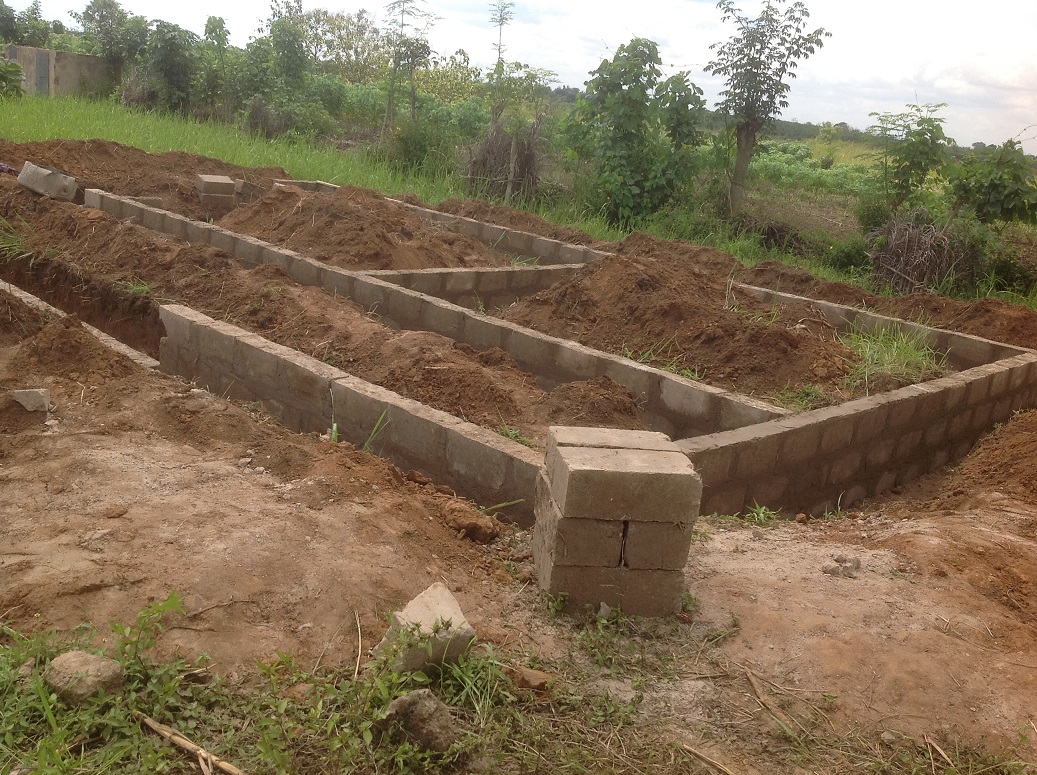 New building foundation New building foundation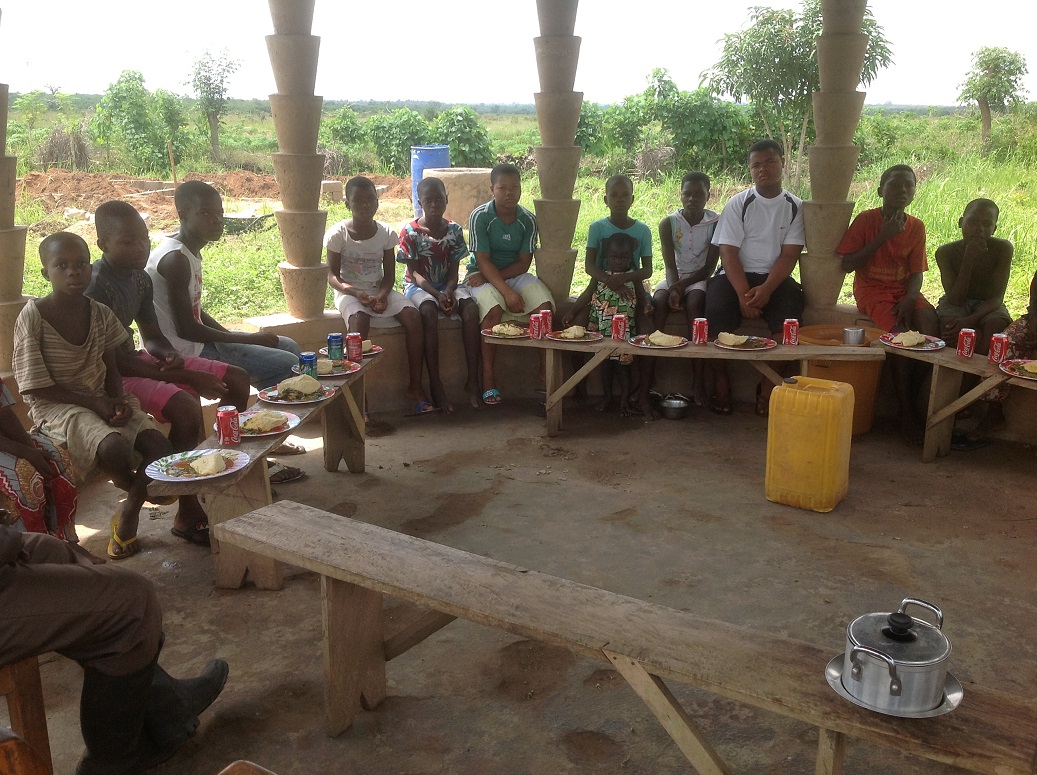 Enjoying lunch October 2015After Pastor Sika's return to Togo in late September 2015 several new projects were begun at the orphanage. They include: planting dozens of new palm trees (which will hopefully produce much-needed cooking oil in future years); planting a thorny hedge around the perimeter (for better security); improving the water well and cooking facilities; starting a small vegetable garden to teach the children other aspects of food production; and beginning the foundation for a new concrete building within the JP compound. This is needed for several reasons - one of the dormitories has developed bad cracks in the walls (since like other local buildings it was built of mud); and to resolve local problems and be able to obtain government accreditation as an orphanage, such a building is urgently needed. It is planned be used as a dormitory, office, and lockable storage. Enjoying lunch October 2015After Pastor Sika's return to Togo in late September 2015 several new projects were begun at the orphanage. They include: planting dozens of new palm trees (which will hopefully produce much-needed cooking oil in future years); planting a thorny hedge around the perimeter (for better security); improving the water well and cooking facilities; starting a small vegetable garden to teach the children other aspects of food production; and beginning the foundation for a new concrete building within the JP compound. This is needed for several reasons - one of the dormitories has developed bad cracks in the walls (since like other local buildings it was built of mud); and to resolve local problems and be able to obtain government accreditation as an orphanage, such a building is urgently needed. It is planned be used as a dormitory, office, and lockable storage.
|
|
|
